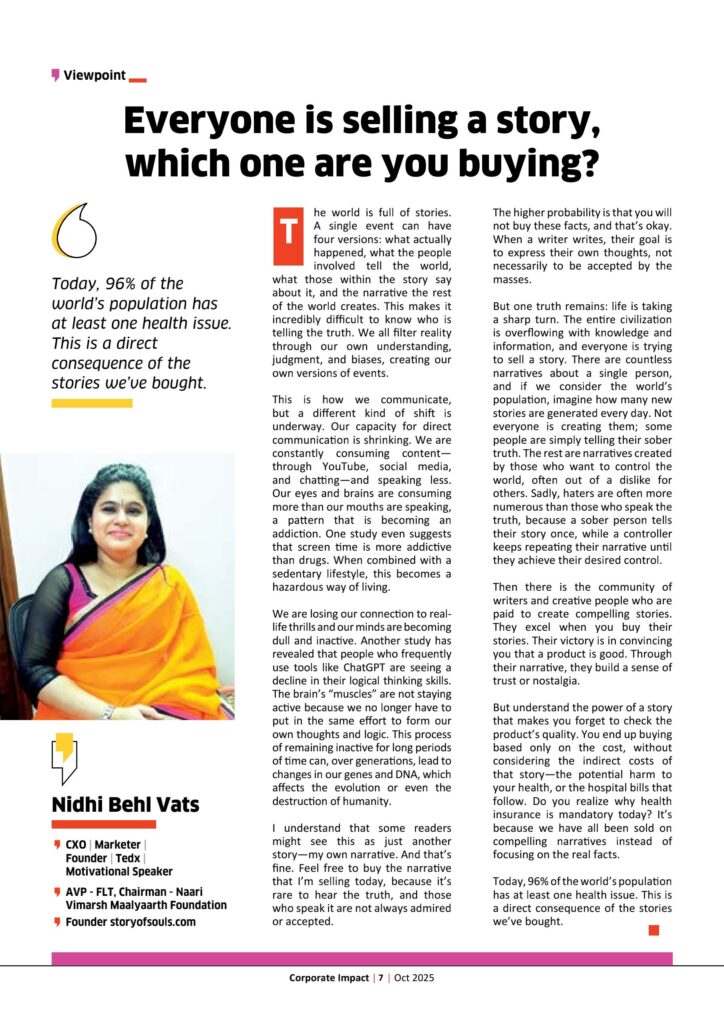Today, 96% of the world’s population has at least one health issue. This is a direct consequence of the stories we’ve bought.
Nidhi Behl Vats
CXO | Marketer | Founder | Tedx | Motivational Speaker
AVP – FLT, Chairman – Naari Vimarsh Maalyaarth Foundation
Founder storyofsouls.com
The world is full of stories. A single event can have four versions: what actually happened, what the people involved tell the world, what those within the story say about it, and the narrative the rest of the world creates. This makes it incredibly difficult to know who is telling the truth. We all filter reality through our own understanding, judgment, and biases, creating our own versions of events.

This is how we communicate, but a different kind of shift is underway. Our capacity for direct communication is shrinking. We are constantly consuming content—through YouTube, social media, and chatting—and speaking less. Our eyes and brains are consuming more than our mouths are speaking, a pattern that is becoming an addiction. One study even suggests that screen time is more addictive than drugs. When combined with a sedentary lifestyle, this becomes a hazardous way of living.
We are losing our connection to real-life thrills and our minds are becoming dull and inactive. Another study has revealed that people who frequently use tools like ChatGPT are seeing a decline in their logical thinking skills. The brain’s “muscles” are not staying active because we no longer have to put in the same effort to form our own thoughts and logic. This process of remaining inactive for long periods of time can, over generations, lead to changes in our genes and DNA, which affects the evolution or even the destruction of humanity.
I understand that some readers might see this as just another story—my own narrative. And that’s fine. Feel free to buy the narrative that I’m selling today, because it’s rare to hear the truth, and those who speak it are not always admired or accepted.
The higher probability is that you will not buy these facts, and that’s okay. When a writer writes, their goal is to express their own thoughts, not necessarily to be accepted by the masses.
But one truth remains: life is taking a sharp turn. The entire civilization is overflowing with knowledge and information, and everyone is trying to sell a story. There are countless narratives about a single person, and if we consider the world’s population, imagine how many new stories are generated every day. Not everyone is creating them; some people are simply telling their sober truth. The rest are narratives created by those who want to control the world, often out of a dislike for others. Sadly, haters are often more numerous than those who speak the truth, because a sober person tells their story once, while a controller keeps repeating their narrative until they achieve their desired control.
Then there is the community of writers and creative people who are paid to create compelling stories. They excel when you buy their stories. Their victory is in convincing you that a product is good. Through their narrative, they build a sense of trust or nostalgia.
But understand the power of a story that makes you forget to check the product’s quality. You end up buying based only on the cost, without considering the indirect costs of that story—the potential harm to your health, or the hospital bills that follow. Do you realize why health insurance is mandatory today? It’s because we have all been sold on compelling narratives instead of focusing on the real facts.
Today, 96% of the world’s population has at least one health issue. This is a direct consequence of the stories we’ve bought.













